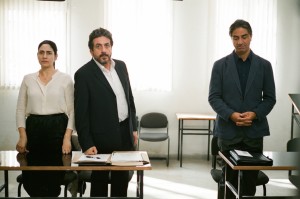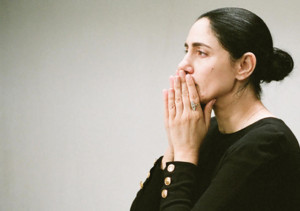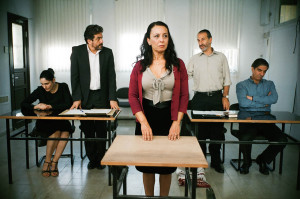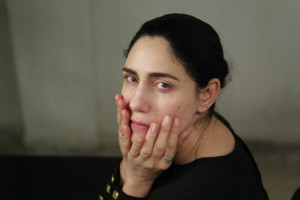Ronit and Shlomi Elkabetz’s Gett: The Trial of Viviane Amsalem is a work of such staggering importance that its significance to its own culture (Israel), certainly relevant, is secondary to its challenge to the essentials of patriarchy, and all power systems within it. The most important art must, after all, transcend the boundaries of production arena and historical moment (this is not to say all art must have “universal appeal”). Gett is, of course, an Israeli film, and may represent the finest work of that national cinema. I say this with some qualification, since the preoccupation with national cinemas tends to lessen, I think, appreciation of a given work’s value (“one of the great Israeli films”). I have to be careful with my qualification, however, since for one thing I have little knowledge of Israeli culture, to a point that I fear I miss the meaning of some gestures used by the film’s characters. Still, at a time when there is, certainly in the US, a War on Women, rolling back women’s rights in all areas, from sexual/reproductive rights to wages, in an attempt to put them “in their place”(a phrase used by a judge in the film) Gett is a profound meditation, a necessary work.
Gett offers instruction about the role of patriarchy in the supposedly “post-feminist” historical moment. Israel seems a nation retaining some vestiges of democracy (I will ignore for the moment its treatment of Palestinian Arabs, which I deplore, as I do the nation’s role as client of the US), with Gett offering devastating judgment on this country’s incredibly retrograde, systematic, and legitimized mistreatment of women. Since we have in front of us a condemnation of Israel’s view of essential things (the dignity of over one-half of the human race), one could argue that the film is a condemnation of Israel’s conduct in all things. Perhaps this is true, but we would be foolish to view the film from some Olympian distance. Gett is about nothing less than the implications of theocracy, the fusion of secular and religious authority, an ideal goal for men since history began, with its patriarchal mythologies, as women’s interests are dismissed. The film reminds us of patriarchy’s original and still fundamental premise: its authority flows from the divine, so male authority is part of the natural order of things.
 Viviane Amsalem (the stunning Ronit Elkabetz) wants a gett (divorce) from her reptilian husband Elisha (Simon Abkarian). This seems a simple subject, but it is hugely complicated by two factors: her husband refuses to “grant” the divorce despite behavior that should enrage the court, and in Israel all domestic relations/marriage issues are judged by rabbis. The couple sits before three rabbis ensconced behind a high wooden bench bearing a bronze plaque with a bas-relief menorah. For the first few minutes of the film they are heard rather than seen, the voice of an omniscient God. The head rabbi is named Solomon (the imposing Eli Gornstein) – surely the film uses the biblical all-wise figure to mock the arrogance and stupidity governing the court. Solomon’s booming voice is at the center of the film.
Viviane Amsalem (the stunning Ronit Elkabetz) wants a gett (divorce) from her reptilian husband Elisha (Simon Abkarian). This seems a simple subject, but it is hugely complicated by two factors: her husband refuses to “grant” the divorce despite behavior that should enrage the court, and in Israel all domestic relations/marriage issues are judged by rabbis. The couple sits before three rabbis ensconced behind a high wooden bench bearing a bronze plaque with a bas-relief menorah. For the first few minutes of the film they are heard rather than seen, the voice of an omniscient God. The head rabbi is named Solomon (the imposing Eli Gornstein) – surely the film uses the biblical all-wise figure to mock the arrogance and stupidity governing the court. Solomon’s booming voice is at the center of the film.
 Instead of being a simple negotiation, what occurs is indeed a trial. The film’s subtitle in French is, of course, Le Procès de Viviane Amsalem, recalling Kafka, but more importantly how a person is indeed processed, and pulverized by the law. Although Viviane is the plaintiff, she is treated wholly as a defendant (the proceeding evoking the idea that complaining women are guilty of something), mercilessly interrogated by the head rabbis and Elisha’s attorney brother, the vicious Rabbi Shimon (Sasson Gabbi). Viviane has very few rights. As Viviane’s counsel says: “The law favors a husband’s will over a wife’s wishes.”
Instead of being a simple negotiation, what occurs is indeed a trial. The film’s subtitle in French is, of course, Le Procès de Viviane Amsalem, recalling Kafka, but more importantly how a person is indeed processed, and pulverized by the law. Although Viviane is the plaintiff, she is treated wholly as a defendant (the proceeding evoking the idea that complaining women are guilty of something), mercilessly interrogated by the head rabbis and Elisha’s attorney brother, the vicious Rabbi Shimon (Sasson Gabbi). Viviane has very few rights. As Viviane’s counsel says: “The law favors a husband’s will over a wife’s wishes.”
The first eight shots of the film are instructive, all from Viviane’s point of view; she is chiefly an observer, forced to allow men to work out her fate. The first shot is stunning: a good-looking, dark-haired man with rather menacing arched eyebrows looks down at her/us. The image appears suddenly after dramatic black-on-red titles, accompanied by the doleful score by Dikla and Shaul Beser. It is an archetypal low-angle shot, suggesting we must “look up to” the subject. The ambiguity of the shot flows from the man’s kind-but-tough masculinity, a basic benevolence combined with authority. The look of the man is momentarily threatening: whose side is he on? It is Viviane’s lawyer Carmel Ben Tovin (Menashe Noy, whose power informs the film’s sense of outrage), a very sympathetic presence, not just the plaintiff’s hired gun – we have reason later to believe he is in love with Viviane. He is well-known to all and admired by many in the narrative, who see him as a kind and thoughtful man. But the first image, with its adroit complexity, introduces the film’s thesis. Can Carmel truly be seen as the film’s “hero” with whom we must identify, the man valiantly defending Viviane? Certainly it is hard not to see Carmel as heroic, his defense of Viviane tireless. But Viviane must negotiate within a world of men, one struggling with its own internecine conflicts.
Carmel, almost an Enlightenment figure relative to the rest of the male group, at various points must prove his devotion to The Book – the head rabbi scolds him for not wearing a skullcap in court. He asserts machismo, as lawyers do, by out-maneuvering the opposition, and affirming his heterosexuality when it is gratuitously revealed by the court (albeit in private conversation) that he is unmarried.
The Room
 Viviane’s entrapment has its strongest emblem in the small, box-like, suffocating courtroom, with its white walls (water stains are visible, suggesting a sense of decay), small seats and plain desks for the plaintiff, defendant, and non-existent audience (there are only a couple of scattered chairs in the room in any case), the three rabbis looking down on all. Windows at back of the room and behind the judges have something like plastic blinds to keep out the heat (the heat of Israel is conveyed by short sleeves, light clothes, and open collars – the rabbi/judges, who represent heat/pressure, are necessarily clad in heat-retaining black, a non-color always suggesting death). There is a door for entrance and exit on the two sides of the room, assisting comedy – and later terror – as people try hurriedly to leave. The black front door is set in a large, imposing black frame. The set is a most intelligent achievement by Ehud Gutterman, the design integrated quietly within the film’s narrative, always reminding us of the awfulness of Viviane’s crisis without asking to be noticed.
Viviane’s entrapment has its strongest emblem in the small, box-like, suffocating courtroom, with its white walls (water stains are visible, suggesting a sense of decay), small seats and plain desks for the plaintiff, defendant, and non-existent audience (there are only a couple of scattered chairs in the room in any case), the three rabbis looking down on all. Windows at back of the room and behind the judges have something like plastic blinds to keep out the heat (the heat of Israel is conveyed by short sleeves, light clothes, and open collars – the rabbi/judges, who represent heat/pressure, are necessarily clad in heat-retaining black, a non-color always suggesting death). There is a door for entrance and exit on the two sides of the room, assisting comedy – and later terror – as people try hurriedly to leave. The black front door is set in a large, imposing black frame. The set is a most intelligent achievement by Ehud Gutterman, the design integrated quietly within the film’s narrative, always reminding us of the awfulness of Viviane’s crisis without asking to be noticed.
As Viviane listens to the presiding rabbis and Carmel’s responses, Elisha tries to catch her gaze. At one instance he points his right forefinger to his right eye. There may be some cultural significance here beyond “I’m watching your every move.” Elisha’s gaze is constantly threatening. Viviane says “I’m not going back.” His retort is “We’ll see about that.” During one of his early asides to Viviane, he says, using a plaintive tone “There is nothing out there” – meaning the world has nothing to offer unmarried women. Her battle seems impossible, since the rabbis insist that “reconciliation,” and therefore a restoration of the patriarchal family (validating the Law), can and must occur.
The Law and the Male
 The law assists the husband simply because he is male, since Judeo-Christian myth puts all power in male hands. At the film’s outset we learn that Viviane hasn’t lived with Elisha for three years, during which she has petitioned the court – we therefore see her agony in medias res. Elisha wants to test his wife’s nerves, knowing he has the upper hand. He uses delaying tactics, not even showing up for hearings – we see titles stating the passage of time (“two months later,” “three weeks later”). The entire “hearing” consumes five years of Viviane’s life – meaning that she endures Elisha’s torture for eight years, nearly a decade, all with the court allowing Elisha to ignore the law. Rabbi Solomon tells Viviane that he will take action against Elisha by taking his driver’s license (he doesn’t drive because he’s afraid his wife might make him drive on the Sabbath), or going after his credit cards (he has none, knowing how to dodge investigation), or closing his bank account (which will penalize Viviane, since they have a shared account, reminding us of the financial dependency of the woman, and of the traps caused by marital “intimacy”). When Carmel tells the court, in an effort to establish Viviane’s good-citizenship, that she is a self-employed hairdresser out of her sister’s home, the remark is ignored, meaningless in elevating her legitimacy.
The law assists the husband simply because he is male, since Judeo-Christian myth puts all power in male hands. At the film’s outset we learn that Viviane hasn’t lived with Elisha for three years, during which she has petitioned the court – we therefore see her agony in medias res. Elisha wants to test his wife’s nerves, knowing he has the upper hand. He uses delaying tactics, not even showing up for hearings – we see titles stating the passage of time (“two months later,” “three weeks later”). The entire “hearing” consumes five years of Viviane’s life – meaning that she endures Elisha’s torture for eight years, nearly a decade, all with the court allowing Elisha to ignore the law. Rabbi Solomon tells Viviane that he will take action against Elisha by taking his driver’s license (he doesn’t drive because he’s afraid his wife might make him drive on the Sabbath), or going after his credit cards (he has none, knowing how to dodge investigation), or closing his bank account (which will penalize Viviane, since they have a shared account, reminding us of the financial dependency of the woman, and of the traps caused by marital “intimacy”). When Carmel tells the court, in an effort to establish Viviane’s good-citizenship, that she is a self-employed hairdresser out of her sister’s home, the remark is ignored, meaningless in elevating her legitimacy.
In an early phase of the years-long hearing, the presiding rabbis actually force Viviane to return to her home for several months (with a manifestly suspect and disliked man) to see if things can be worked out with (or rather for) her husband. This is imposed on Viviane because Elisha has again simply decided not to appear. She has no choice but to accept, although she is diligent at the end of the imposed sentence (and it can only be called such) in taking Elisha back to court. The rabbis want “evidence” to permit her divorce – as Rabbi Shimon says, “If a man beats his wife, or refuses her pleasure or food, then we would have something to talk about.” In other words, the man must be monstrous to the woman before there is “reason” to deprive the male of his rule over her life (the “pleasure” alluded to by Shimon is obviously the male’s). The court cannot accept her simple, obvious incompatibility with Elisha – and outright disgust with him. The latter, in fact, informs the rabbis’ anger. A key reason for Viviane’s complaint – Elisha’s religiosity and the torment that flows from it – is a truth that dares not speak its name.
The Law of the Father
The fusion of the law with religion and male authority is underscored when Carmel first meets the awful Rabbi Shimon, Elisha’s counsel, in a court anteroom – another white, barren, cramped space. Shimon is often photographed to convey a stooped, grinning ghoul, his expression a cross between a smile and a sneer. Shimon enjoys persecution, for all his talk of the Torah and uplifting Israel. His meanness (in every sense of the word) and bold, openly vile manner embodies the atavistic justice system that is the film’s topic.
 Shimon knows Carmel’s family. He asks about Carmel’s mother, then brings up his late father, Sasson Ben Tovan, obviously a figure of respect among scholarly rabbis according to Shimon’s nods to Carmel, obviously to throw the son off his game. Shimon says “He always knew!” Carmel replies “He knew what?” Shimon answers: “He knew a lot, a lot of things.” Carmel turns away from Shimon with “Yes, he knew many things.” Carmel’s tone suggests that he has less-than-pleasant memories of his father, implying a traditional Oedipal battle while enlightening us to Carmel’s distaste for religious life, dependent as it is on mysticism and authority rather than logic and reason. But his thoughts are tactfully suggested by the film, rather than stated outright. This rendering of the character accents the sense that one must be cautious lest a line is stepped over.
Shimon knows Carmel’s family. He asks about Carmel’s mother, then brings up his late father, Sasson Ben Tovan, obviously a figure of respect among scholarly rabbis according to Shimon’s nods to Carmel, obviously to throw the son off his game. Shimon says “He always knew!” Carmel replies “He knew what?” Shimon answers: “He knew a lot, a lot of things.” Carmel turns away from Shimon with “Yes, he knew many things.” Carmel’s tone suggests that he has less-than-pleasant memories of his father, implying a traditional Oedipal battle while enlightening us to Carmel’s distaste for religious life, dependent as it is on mysticism and authority rather than logic and reason. But his thoughts are tactfully suggested by the film, rather than stated outright. This rendering of the character accents the sense that one must be cautious lest a line is stepped over.
The conflict between Carmel and Shimon represents, I think, a problem that is distinctly Israeli yet, again, universal. Carmel is an enlightened man, an authentic scholar, a secular Jew, versus the brutal nincompoop who represents turning the clock backward, holding onto religious myth and authority, upheld not by argument but rather intimidation.
Shimon senses Carmel’s issues with his late father. When the hearing reconvenes (having been postponed again by the court itself), he finds an opportunity to dig at Carmel by implying that the great Sasson Ben Tovin would be disappointed by his wayward son. Carmel explodes. Shimon – photographed momentarily in close-up to accent his physical and moral ugliness – reminds Carmel that his father was “a guiding light to many good men,” repeating the phrase “many good men” (a group that of course excludes Carmel) several times as he points his right forefinger heavenward. The rabbis say nothing about this nonsense; it is Carmel who reminds all parties that his father has no relevance to the proceedings.
Carmel is at loggerheads with both Shimon and the court. When he approaches the bench, a rabbi asks him if he is married. Carmel replies “I am not on trial!” Rabbi Solomon, in his sonorous voice, declares “Everyone is on trial,” meaning not just that God is always watching us, but that the court can do as it likes. When Carmel answers that he is unmarried, a rabbi says “The truth comes out!,” then asks if he has a “defect.” Is he gay? Impotent? The importance of the family, governed by the male is central to Israeli society, or so authority pretends. Carmel’s obvious distaste for bourgeois mores becomes increasingly visible, especially when a witness says he saw Viviane and “another man” in a café – the other man is Carmel, who protests that he was merely meeting her as a client. All parties – with the exception of Rabbi Shimon – protest that Viviane is not an “adulteress” (one can’t help recalling that such terms are derived from biblical notions of the female as property not to be “coveted” by other men). Even Elisha leaps to his feet debunking the “adulteress” label, since proof of this would humiliate him and lower the religious stature he constantly asserts.
Eros Assertive
 As Viviane is pilloried either by the court or through cruel assertions made by others, the force of eros poses hope, yet a constant threat to Vivian’s fate. As arguments continue, bearing down on her with a physical force (Ronit Elkabetz wonderfully conveys her character’s physical and spiritual misery), Viviane undoes her long brown hair, letting it fall loosely over her left shoulder. A rabbi shouts “what are you doing Mrs. Ansalem?!” Viviane tries to ignore the harassment. The camera twice catches Viviane’s bare, crossed legs under the desk, her feet clad in toeless, high-heeled sandals; at one point her legs drift slightly toward Carmel. These images are problematical, since they are from the point of view of an obnoxious male witness for Elisha (who is taken apart by Carmel). The images set up a tortured dialectic; woman’s free expression of sexuality is imposed upon by the intrusive male.
As Viviane is pilloried either by the court or through cruel assertions made by others, the force of eros poses hope, yet a constant threat to Vivian’s fate. As arguments continue, bearing down on her with a physical force (Ronit Elkabetz wonderfully conveys her character’s physical and spiritual misery), Viviane undoes her long brown hair, letting it fall loosely over her left shoulder. A rabbi shouts “what are you doing Mrs. Ansalem?!” Viviane tries to ignore the harassment. The camera twice catches Viviane’s bare, crossed legs under the desk, her feet clad in toeless, high-heeled sandals; at one point her legs drift slightly toward Carmel. These images are problematical, since they are from the point of view of an obnoxious male witness for Elisha (who is taken apart by Carmel). The images set up a tortured dialectic; woman’s free expression of sexuality is imposed upon by the intrusive male.
Viviane’s affection for Carmel becomes manifest as Carmel remains impassive, the retaliation of the rigid court always a threat – Viviane seems to feel she has little to lose. As one of the many hearings ends, Viviane pauses momentarily to look at Carmel. When they wait in the anteroom as delays persist, she tells Carmel that his shirt collar is caught inside his jacket. Her charity and love are plain. The film establishes, in small increments, Viviane/the female as a threat to the awful system of law by her very presence, by her sexuality and capacity to love, while her husband is an archetypal antithesis, a figure of repression and death.
 The hatred of the female is displayed without concessions. Witnesses come forth, at first women sympathetic to Viviane, including her sister-in-law Evelyn (Evelin Hagoel), an unmarried woman whose “barrenness” discredits her. She is admonished simply for walking over to Vivian to embrace her. Viviane’s sister Rachel (Rubi Porat Shoval) is wildly funny, a force that can’t be contained by the rabbis. She says that she at first wanted Viviane to stay with Elisha since “an unmarried woman in Israel eats shit!” arousing Rabbi Solomon’s outrage. Vivian cannot help but laugh, drawing more warnings. But Rachel does as much harm as good, accepting as she does the rules of her country’s sexual/religious game, while deploring “the Russian immigration” (of Soviet Jews) , evidencing her ethnic bias.
The hatred of the female is displayed without concessions. Witnesses come forth, at first women sympathetic to Viviane, including her sister-in-law Evelyn (Evelin Hagoel), an unmarried woman whose “barrenness” discredits her. She is admonished simply for walking over to Vivian to embrace her. Viviane’s sister Rachel (Rubi Porat Shoval) is wildly funny, a force that can’t be contained by the rabbis. She says that she at first wanted Viviane to stay with Elisha since “an unmarried woman in Israel eats shit!” arousing Rabbi Solomon’s outrage. Vivian cannot help but laugh, drawing more warnings. But Rachel does as much harm as good, accepting as she does the rules of her country’s sexual/religious game, while deploring “the Russian immigration” (of Soviet Jews) , evidencing her ethnic bias.
The summoning of “witnesses” to a divorce hearing speaks to the manifest absurdity of the affair; as Carmel points out, the court seems able to read people’s minds about the private affairs of a couple. The male witnesses support, if at times falteringly, all of Elsha’s remarks while painting him as a saint. The women would like to support Viviane, testifying to her misery, but at points are intimidated by the male-controlled circumstance. At some points people say things that they couldn’t possibly know as fact as the court manipulates and drags out the process.
Inferno
The torment facing women within this legal system reaches its nadir when the Abecassis couple, neighbors of the Amselams, are called to testify. Donna Abecassis (Dalia Beger) is terrified of her husband, an obvious brute, who is told by the tribunal to step back behind a pillar (instead of removing him outright). Donna is in tears as we learn, under Carmel’s questioning, that Donna has been a baby factory for her husband, who wants sons (it is expected, so we are told, that each woman produces four children, male offspring infinitely preferred over girl). Donna is also forced to cook into the night. Carmel’s interrogation is brutal, but it is intended both to reveal that Donna Abecassis will say anything to please her husband, who is a friend of Elisha. She serves a specific dramatic function within the narrative. Donna’s tearful testimony makes the film’s points very expansive; this is certainly not a film about this case alone, but about the plight of the female in Israel. Rachel’s earlier remark, humorous at the time, makes terrible sense now: “In Israel women eat shit!”
Soon Viviane is at the breaking point. When she quietly mocks Solomon, he retorts “Know your place, woman!” She replies, very softly, “I know my place your Honor.”
 In a later scene, she stands by the black door, her long hair flowing over a thin white blouse, as she is mercilessly grilled by Shimon. Shimon is in medium shot in the middle of the frame, now wearing a sport coat. He is a skinny, evil little man, one of great power who basks in his status in the court’s eyes. He says: “Viviane Amsalem, you are a wayward woman!” He beats the religion drum repeatedly, accusing Viviane of not “keeping a Jewish home,” of interfering with her husband’s devotion to the Torah, of preventing him from wearing a skullcap, of ignoring the Sabbath, of harassing him and actually beating him physically. Shimon begins one harangue with “My sister…” Viviane interrupts with: “Do not call me sister and then curse me.” The traumatized Viviane turns tearfully toward Carmel. He approaches his client; the camera closes in on him as it becomes his burden to ask the most personal, but the most relevant questions. He asks Viviane “how long has your husband not come to you?” Viviane, crying, hesitates, eventually getting out “a long time.” Carmel presses the matter: “How long?” The most Viviane can say is “many years.” The husband’s impotence – and general malevolence hidden behind sanctimony – is at issue rather than kosher food and the Sabbath. That the “accused” person has asserted a key sexual “defect” constantly imputed to her and her counsel brings the pot to a boil, and Shimon is ready. “Evidence” has already been introduced by a shady witness, who states that Carmel met with Viviane at a café (cafes are termed by Elisha “not kosher”). Carmel says he often meets clients at the café – but the seed has been planted. Shimon turns toward Carmel and slowly raises his left arm, pointing, Lugosi-like, at Carmel, accusing him of “desiring this woman.” Shimon emits something like a growl. At first Carmel laughs off the accusation, then explodes in outrage as Solomon repeats Shimon’s question. The irrelevance of all this bothers the court not a bit; the rabbis increase their contempt for both Viviane and her counsel. Now enraged, Carmel insists that Solomon is allowing a miscarriage of justice as well as defaming him, demanding that Solomon remove himself.
In a later scene, she stands by the black door, her long hair flowing over a thin white blouse, as she is mercilessly grilled by Shimon. Shimon is in medium shot in the middle of the frame, now wearing a sport coat. He is a skinny, evil little man, one of great power who basks in his status in the court’s eyes. He says: “Viviane Amsalem, you are a wayward woman!” He beats the religion drum repeatedly, accusing Viviane of not “keeping a Jewish home,” of interfering with her husband’s devotion to the Torah, of preventing him from wearing a skullcap, of ignoring the Sabbath, of harassing him and actually beating him physically. Shimon begins one harangue with “My sister…” Viviane interrupts with: “Do not call me sister and then curse me.” The traumatized Viviane turns tearfully toward Carmel. He approaches his client; the camera closes in on him as it becomes his burden to ask the most personal, but the most relevant questions. He asks Viviane “how long has your husband not come to you?” Viviane, crying, hesitates, eventually getting out “a long time.” Carmel presses the matter: “How long?” The most Viviane can say is “many years.” The husband’s impotence – and general malevolence hidden behind sanctimony – is at issue rather than kosher food and the Sabbath. That the “accused” person has asserted a key sexual “defect” constantly imputed to her and her counsel brings the pot to a boil, and Shimon is ready. “Evidence” has already been introduced by a shady witness, who states that Carmel met with Viviane at a café (cafes are termed by Elisha “not kosher”). Carmel says he often meets clients at the café – but the seed has been planted. Shimon turns toward Carmel and slowly raises his left arm, pointing, Lugosi-like, at Carmel, accusing him of “desiring this woman.” Shimon emits something like a growl. At first Carmel laughs off the accusation, then explodes in outrage as Solomon repeats Shimon’s question. The irrelevance of all this bothers the court not a bit; the rabbis increase their contempt for both Viviane and her counsel. Now enraged, Carmel insists that Solomon is allowing a miscarriage of justice as well as defaming him, demanding that Solomon remove himself.
Another rabbi, another delayed hearing, but at the next meeting Elisha, after serving a short stint in jail, says he will agree to a gett. But once in the court, he reneges yet again. Viviane turns into a righteous dybbuk (the one of mythology is usually male, and of bad intent), a primal force, cursing the court. She eventually screams “in America it would be all over” (would it?). She comes close to cursing Judaism itself for treating her as a non-person, saying “Rabbinical court? Shitty court, shitty people!,” bringing down the apocalypse, shouting “One day someone will take the power from your hands!,” totally infuriating the tribunal (“Shut up!”) – Viviane is removed from the court.
At the next hearing Elisha says he will grant the divorce. The rabbis put the two through a ritual, wherein Rabbi Solomon folds a piece of paper which he places in Elisha’s hand. He is to place it in Viviane’s upturned hands – she is admonished by Solomon on the proper way to cup he hands and receive the document (she cannot do the simplest thing correctly, it seems). Elisha is told to recite a ritual statement – but he cannot complete the final phrase, which would give Viviane her freedom. She is dumbfounded, then terrified. But he will not complete the ritual. Viviane, now hysterical after years of torture, runs about the courtroom, pushing chairs and tables aside – female hysteria, as Robin Wood remarked, is not endemic to the gender as patriarchal myth has it, but a logical expression of hopeless disempowerment. She approaches Elisha, but court bailiffs keep her back. Rabbi Solomon says he wants the couple out of his sight. He will not see either one again—as if they are both at fault, both an intolerable annoyance to the venerable men whose time is precious.
The Portraits
 There are several notable portrait shots of Viviane/Ronit Elkabetz in the film. They are very well-judged, and anything but acts of narcissism on the part of Ronit (I can’t help but see her as the film’s prime creator). We see Viviane in profile, awaiting the beginning of the day’s ordeals, the camera then looking down from a slightly high angle at her back, her blouse of a slightly peek-a-boo design, but the effect is to suggest the pressure on her body destroying her sexually and physically. At the start of the film’s final chapter, she is shown in medium close-up in a black blouse, her eyes focused just slightly above the camera’s lens. It is a presentational moment, because it seems both within and outside the narrative. I thought for a moment of Maria Falconetti in The Passion of Joan of Arc (1928), but there is nothing here that lugubrious. The close shots of Viviane/Ronit convey nothing less than the dignity of woman. The images do connect to Dreyer, Bresson, Dumont, and other male directors (and artists dating at least to the quattrocento) who have dealt with female agony with focus on their continuity, a reminder of how the sacrifice of woman is a constant of patriarchal history.
There are several notable portrait shots of Viviane/Ronit Elkabetz in the film. They are very well-judged, and anything but acts of narcissism on the part of Ronit (I can’t help but see her as the film’s prime creator). We see Viviane in profile, awaiting the beginning of the day’s ordeals, the camera then looking down from a slightly high angle at her back, her blouse of a slightly peek-a-boo design, but the effect is to suggest the pressure on her body destroying her sexually and physically. At the start of the film’s final chapter, she is shown in medium close-up in a black blouse, her eyes focused just slightly above the camera’s lens. It is a presentational moment, because it seems both within and outside the narrative. I thought for a moment of Maria Falconetti in The Passion of Joan of Arc (1928), but there is nothing here that lugubrious. The close shots of Viviane/Ronit convey nothing less than the dignity of woman. The images do connect to Dreyer, Bresson, Dumont, and other male directors (and artists dating at least to the quattrocento) who have dealt with female agony with focus on their continuity, a reminder of how the sacrifice of woman is a constant of patriarchal history.
Marriage and Prostitution
It seems that Viviane resigns herself to the mental torture and emotional/physical imprisonment imposed by her husband and the court. But there is a quiet moment, focusing on Carmel standing, Viviane seated, in an anteroom, Elisha and Shimon in conversation in the background. Shimon approaches Viviane. What follows is a shot/countershot sequence filmed in close-up, alternating between Viviane and Elisha as they face each other across a table. Elisha says he will grant the divorce. Viviane, now looking radiant despite the torment, is certain it’s another trick. But Elisha assures her it isn’t. Then the abominable – he asks “what will you give to me?” Viviane is perplexed. Elisha moves his brow and eyelids in what passes for a seductive gesture. He will grant the divorce if she will fuck him. Thus Elisha is willing to free her if he can make her once more accept submission – the ultimate submission, an act that is rape, but is also tied here to a mode of exchange. The moment underscores a point made by radical (and most insightful) feminism: marriage is simply the form of prostitution sanctioned by patriarchy, the means by which woman attempts to protect herself from the world, to guarantee a home and nourishment, by giving her body over to the male. The statement may seem wildly off the mark in this day and age, with women able to secure their own income. But the film’s point is clear, and it would be unreasonable not to observe the actual-existing conditions of women throughout the world, at a time when women’s rights are devolving, as women are forced back “in their place,” as Solomon says.
Viviane seems only mildly surprised by Elisha’s “deal,” reminding him that she is not coming back. He says “I love you.” This common expression by the male justifies all, and demands that it be interrogated. The man “loves” to assure control, to be sure, but uses it also as an expression of self-pity and self-justification, certainly the case with the hang-dog, manipulative, amoral Elisha, who feels put-upon by the world, but justifies his sociopathy with religiosity – God told him to.
 Viviane accepts his terrible arrangement – at her moment of triumph she is degraded. She tells her husband “There’ll be no one after you.” Unless there is some nuance of Judaic law demanding this remark (one can hardly imagine that to be the case), Viviane decides she has had enough, and places herself in emotional and sexual isolation for the rest of her life, in a sense a fitting enough testament to the terrors of marriage under current arrangements. Is Carmel aware of the “deal”? One would hope not; we see him and Shimon in the anteroom as Elisha returns. Certainly the two men know some kind of strange bargain has been accomplished. The notion of the whole proceeding being a conspiracy of men once more comes to mind.
Viviane accepts his terrible arrangement – at her moment of triumph she is degraded. She tells her husband “There’ll be no one after you.” Unless there is some nuance of Judaic law demanding this remark (one can hardly imagine that to be the case), Viviane decides she has had enough, and places herself in emotional and sexual isolation for the rest of her life, in a sense a fitting enough testament to the terrors of marriage under current arrangements. Is Carmel aware of the “deal”? One would hope not; we see him and Shimon in the anteroom as Elisha returns. Certainly the two men know some kind of strange bargain has been accomplished. The notion of the whole proceeding being a conspiracy of men once more comes to mind.
In the final shots, Viviane sits, then stands, by a table, alone in a room whose dirty windows reveal traffic (an unwholesome image of freedom) outside. The camera then cuts to her feet, now clad in plain cloth slippers. There is the sense that all energy has been drained from her, her age now visible. The camera stays on her feet, following her as she walks on cracked tiles to another room, where a door is being held for her, a man’s shoes visible by its edge. We don’t see Carmel – there is no knight to accompany her into the sunset.
The Trilogy
Gett is the last film of a trilogy about marriage by Ronit and Shlomi Elkabetz. Each film can be viewed independent of the others, but it is instructive to view all of them, and in order, starting with To Take a Wife (2004), followed by Shiva/7 Days (2008). The films introduce and develop the story of the Amsalems, with Viviane played by Ronit Elkabetz and her husband played by Simon Abkarian, although his character’s name is slightly modified for the first two films (perhaps to suggest that things are different, yet the same?). Both of these films are remarkable, although I don’t want to attempt close readings of them here. I will say merely that To Take a Wife is the most remarkable of the two, introducing us to the affairs of the couple early in their marriage – we get the backstory of what is testified to or implied in Gett. I’ll make only a couple of observations about the remarkable opening scene To Take a Wife. We see a close shot of a younger Viviane as she seems to sway gently from one side of the frame to the other, buffeted about by her brothers’ harangue, telling her she must be the dutiful little wife and mend fences with her husband. So we begin with a scene of dreadful torment that also neatly encapsulates the burden of patriarchy on the woman – she is told what she must do until she can stand it no more. She either acquiesces or leaves, and Viviane has not yet decided to abandon the marriage but to “make it work,” something insisted on by the rabbis and Elisha’s friends in Gett. Viviane has a lover, suggesting that her passion is elsewhere, certainly not with Eliyahu (as the husband is named here), nor in the hairdressing job, unrewarding child-rearing (her son, constantly sulking, seems a natural consequence of the marriage, and of Viviane’s excessive mothering, turning the child into a husband, as so often occurs because the actual husband holds no emotional interest). Eliyahu is preoccupied with religion, telling his wife that he can’t do this or that on the Sabbath. Much of this seems chiefly an excuse to show his superiority while distancing himself from his wife.
To Take a Wife is significant for portraying the Amsalem marriage as unremarkable and prosaic, in the sense that the husband doesn’t beat or otherwise brutalize his wife. His torments are humdrum, but constant. The horror is in marriage itself, a form of oppression that becomes a reminder of the desolation of the woman’s life, of opportunities and joy missed.
The melodrama has enjoyed a distinguished history, particularly films by Ophuls, Sirk, Minnelli, and a host of films starring people like Bette Davis, Joan Crawford, Barbara Stanwyck, Joan Bennett, and others. These often surprisingly radical films made in a conservative era (I cite as examples The Reckless Moment, Caught, Letter from an Unknown Woman, All I Desire, Stella Dallas, The Old Maid, Now Voyager, Beyond the Forest, All that Heaven Allows, There’s Always Tomorrow, Home from the Hill) seem things of the distant past, replaced by contemporary feel-good films about families whose nuisance non-problems are handily wrapped up by the final scene. The pervasive philosophy is “we all get along because we’re family.” The outlook is appropriate for a devolving society embracing militarism and basic assumptions of patriarchy for all the chatter about Stalinist “political correctness.”
But we can look to the Elkabetz siblings, and a few others (usually not from the US), for further insightful remarks about our civilization in its decay.
Christopher Sharrett is Professor of Communication and Film Studies at Seton Hall University. He writes regularly for Film International.

